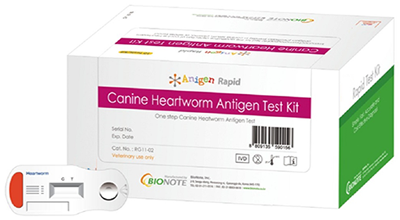Canine Heartworm Antigen Test Kit
Immunochromatographic test for the qualitative detection of Dirofilaria immitis in canine serum, plasma, or whole blood.
Heartworms (Dirofilaria immitis) are relatively large parasites that, in adulthood, live in the heart and pulmonary arteries of infected dogs or cats. Dogs and cats acquire this infection when larval heartworms are transferred between infected and healthy animal via mosquito bites. Geographic areas with a large mosquito population have severe heartworm problems.
Commercial tests will detect antigens from adult female worms. Until now, no commercial test is capable of detecting infections with only male worms. Yet, in a recent study, infections with only male worms occur in 5% of all confirmed cases of heartworms at necropsy.

Features of Canine Heartworm Antigen Rapid Test Kit:
- Highly purified antibodies produced by biotechnology for the detection and capture of heartworm antigens
- Highly sensitive and specific
- Fast results within 5 minutes
- Simple and easy to use
- Free confirmatory test for US customers
- Works with serum, plasma and whole blood
- Storage at room temperature
- Small sample volume (40ul)
- 2-year shelf life

Canine Heartworm Antigen Test Kit available in quantities of 10 or 100
The Canine Heartworm Ag Test Kit is a chromatographic immunoassay for the qualitative detection of Dirofilaria immitis antigen in serum, plasma, or whole blood using anticoagulant (see Insert for details.)
Two large scale studies using 109 samples in the first and 174 in the second were conducted. The sensitivity was 96.4% and the specificity was 100% in the first study; the sensitivity was 94.4% and the specificity was 100% in the second study. In a multicentric field trial study conducted in the US, the sensitivity and specificity were found to be 100%. In a study conducted using samples obtained from animals for which adult male worms alone or mixed with adolescent worms, but without any adult female worms, were recovered at necropsy, the sensitivity was 100%.
Frequently Asked Questions
We recommend EDTA or heparin for whole blood collection, however you can also use citrate. If results are doubtful, please use serum.
The assay diluent is specific to our test. We do not recommend the use of any other solution as we cannot guarantee that the product will work properly.
Any positive result should be confirmed prior to initiating heartworm treatment. A confirmatory test should use a different antigen detection method as the original screening test, thus we recommend a Knot test for detection of microfilariae and a well-ELISA. Modern Veterinary Therapeutics offers complimentary confirmatory testing for our US customers through our lab in Miami. Please email info@modernveterinarytherapeutics.com for more information on obtaining an approval form for this service.
A false positive (or negative) result from an individual animal not resulting from technique errors will continue to occur on multiple tests of the same type. Therefore, the false result is usually caused by some unique characteristics of the particular animal, as opposed to a defective test. This characteristic could be a component of the animal’s blood, which is able to react in a test’s system to show a positive result in the absence of heartworm antigens or a negative result in the presence of heartworm antigens.
The following situations may cause this situation:
- Animal could have adult worms that die and be left with circulating microfilariae
- Microfilariae could be Dipetalonema reconditum, a parasite which does not produce the immitis antigen that our test detects.
- Young dogs born to heartworm-positive mothers could be infected transplacently and be born with circulating microfilariae, but not have adult immitis, therefore no detectable D. immitis antigen.
- Occasionally, microfilariae will be present before detectable levels of antigen have accumulated.




